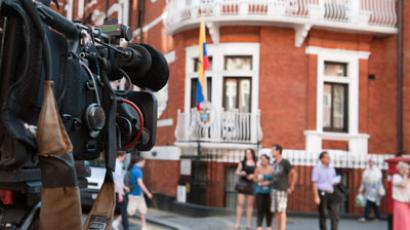‘Assange a pawn in US-led campaign against whistleblowers’
The Assange affair may cause more whistleblowers to put aside their fears speak out, according to Latin American expert Nikolas Kozloff.
He also says that Ecuador’s stance reflects a wider anti-US and British feeling in the region and is playing to nationalist sentiment at home ahead of presidential elections in February 2013.RT: You’ve recently written an article in which you say “Julian Assange has certainly managed to discombobulate and disrupt a larger swathe of the geopolitical system.” And of course you are referring to the fact that this man is an Australian citizen wanted by Sweden, in many respects by the UK and by the US, and now being protected by Ecuador. In your opinion, what was the main reason behind the Ecuadorean president’s decision to grant Julian Assange asylum?Nicholas Kozloff: Well, I think that Correa probably thinks that Julian Assange is persecuted and he is motivated on that score, but I also think that Rafael Correa has his own internal political reasons for granting asylum to Julian Assange. Ecuador holds presidential elections in February of 2013 and I think Rafael Correa seems to be holding a pretty solid margin, a pretty positive margin, but I think he might want to sure up some support and I think this issue plays to nationalist sentiment and a sense of wounded pride, because Ecuador is a small country, it is pretty impoverished, and the United States has intervened over the years in Ecuador on many occasions in the political sphere, in the military sphere and the CIA has even launched destabilization in Ecuador going back to the early ’60s. And so I think Correa is playing on this nationalist sentiment because Ecuadorians don’t like to be bullied, they don’t like to be pushed around. RT: What does Ecuador have to lose by backing Assange, I mean obviously in doing so there is a bit of antagonizing against the US and possibly the UK?NK: Well, Ecuador stands to lose economically because it exports a lot of flowers, also mangoes, pineapples and most importantly petroleum products to the United States. And so these are very vulnerable industries in the event that Washington should retaliate. And already there are business groups in Washington that are loving Obama’s administration to cut off the preferential trade preferences, the duty free trade preferences for Ecuadorian goods. And there was one business representative who actually quoted that “this Assange affair plays to our favor”. These efforts seem to be led by the petroleum industry, which is upset by Correa’s nationalistic oil policy. This is a conflict that actually predicts the Assange affair. By going back several years, you know, Chevron has resisted the Ecuadorian judicial system which says that it should pay damages for environmental pollution in the Ecuadorian Amazon. Before Chevron bought out Texaco, it has been a very tense affair in Ecuador going back some time. And so, according to reports Chevron is leading this lobbying, maybe not leading but at least participating in efforts, to rescind these trade privileges for Ecuador. And in this sense the Assange affair is like a pawn in this wider geopolitical game. So this is not necessarily going help Correa but at least give the oil industry and other industries an excuse to slap on trade restrictions.RT: Ecuador’s neighbors in Latin America have strongly condemned threats coming from the UK on the issue of Ecuador’s granting Julian Assange political asylum. How strong do you believe their support is going to be on this and how much weight will it carry when it comes to this standoff possibly escalating?NK:I think different countries in the region have different agendas. And one interesting facet of this story is the Falkland Islands, believe it or not. Because Argentina has been locked up in this diplomatic battle with Britain over the Falklands for some time and Christina Fernandez de Kirchner has been whipping up diplomatic support for her claims and she’s been quite effective in rounding up support in her corner. Argentina wants to explore for lucrative oil and gas in the Falklands and so Argentina sees this as an opportunity to whip up support against Britain. So I don’t think that Argentina has any particular regard for Julian Assange per se, and in fact a lot of the cables he leaked were quite unflattering towards Argentina, as they cast the Kirchners in an unflattering light. But I think the countries in the region are playing this out for their own political reasons and they have their own constituencies to appease. So I think Argentina wants to appease national sentiment, and Ecuador wants to appease this national sentiment there.Brazil is a little reluctant for the reasons they said before, because Brazil is interested in pursuing this under-the-radar kind of strategy. It probably calculates that it is better not to alienate the US. So I think Brazil will go up to a point with its rhetoric, but maybe not go so far as to join the ALBA countries and the more radical countries such as Venezuela and Ecuador. RT: How would Ecuador manage to rearrange a safe passage for Assange? Because after all as soon as he steps out of the embassy on to the territory of Britain he will be arrested.NK: I don’t really see any necessary way out, if we are not talking about any diplomatic pouches, which seems really arcane to me. But to be sure there is a custom of diplomatic pouches where you can bring that through the airport they can put him in a bag. But it seems very arcane and farfetched to me.RT: If Assange does step on Ecuadorian soil what consequences will it have for the country and for ordinary people living there?NK: At first I wasn’t pretty sure how this issue will play for Correa politically, just because I think many Ecuadorians are very poor, they confront a daily battle for survival, and so at first I thought this a very esoteric issue, people will have more bread-and-butter concerns and in the past few days you’ve seen protests in front of the British consulate in Guayaquil and the British embassy in Quito. And it’s just been a bizarre and surreal sight to see indigenous people dressed in traditional clothing with a handkerchief of Julian Assange, which is very surprising to me. So maybe this suggests that may be this issue resonates and may be Correa has struck a cord and many Ecuadoreans resent the bullying of the United States. And they don’t like being pushed around and so they are going take to this issue.RT: The US State Department has said that it believes the issue surrounding Julian Assange to be a bilateral issue between Ecuador and the United Kingdom, and that the US has no role to play in the matter and that other countries should not get involved. How plausible is that?NK: I find it completely implausible that the United States is not involved in this in some way. The other day the United States said, very ridiculously, that Ecuador should not bring this matter before the Organization of American States, because this is a matter between Ecuador and Britain. But that is just completely preposterous. It’s totally legitimate for Ecuador to raise an issue of its own sovereignty before the Organization of American States. And that just points to the US hypocrisy because The US wants to get its way in the OAS and has done so historically. And now it says, no, you shouldn’t bring this issue before the OAS.RT: International media keeps stressing that the US has not made any moves to requests Assange’s extradition. Do you believe that Washington is actually planning of getting Assange or do they have no interest in bringing Assange to America?NK: I think there’s this grand jury in Virginia that’s empowered to decide on it…RT: But there was a sealed indictment…NK: Well, we don’t know, but I think the State Department and many parties in Washington would love to see Julian Assange brought to justice, and many Republicans and even some Democrats like Diane Weinstein. So the power elite in Washington will probably stop at nothing to get their hands on Julian Assange for releasing the cable-gate scandal and embarrassing the state department, Bur openly they’re not going to say.RT: Why?NK: Well, I think they don’t want look bad on the international arena, they don’t want look vindictive, so they are saying this is the matter for Sweden and these other countries to work out. But I think probably behind the scenes United States is egging on Britain. I find it rather difficult to believe that Britain would not have made these threats without having been pressured by Washington. RT: Given the fact that a number of whistleblowers are being prosecuted by the US government – as a matter of fact, the Obama administration is considered to be waging an unprecedented war on whistleblowers – how do you think it will play in this fight against extradition for Julian Assange and impact the entire whistleblowing movement?NK: Well, I think you’d have to say on balance that this exerts a rather chilling effect. Who the hell wants to seek diplomatic refuge if they can avoid it, and I think a lot of people might be interested in whistleblowing, but not if it means that you’re going to be stateless and you have to seek protection in a foreign embassy. Nevertheless, I’m interested to see that in September there’s a new whistleblowing organization to be launched in Iceland, which has international support. So maybe in the sense what goes around comes around people will see that there has been a persecution of WikiLeaks and it actually might ricochet and there will be even more whistleblowers as a result, because they will see that there has been a crackdown and now there is more need of it than ever.RT: Some experts say that the United Kingdom, in fact all players involved in this circumstance surrounding Julian Assange, have managed to dig themselves in a hole on this issue, diplomatically speaking.What would you consider to be the smartest way out for all of them?NK: Well I think personally that cooler heads will prevail. I think that it’s rather absurd that Sweden did not question Julian Assange in the Ecuadorian embassy to begin with, and a lot of this crisis could have been avoided if Sweden had just gone there and just proceeded with the questioning. But now when it’s escalated beyond that point, I hope cooler heads can prevail and Britain doesn’t go invading the territorial sovereignty of another country.RT: Thank you very much for your time.NK: All right, thank you.














